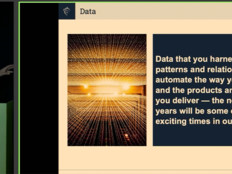Black Friday, the traditional start of the holiday shopping season, is the most important day of the year for most retailers. It’s a chance to turn a profit and create customers for life. Those that fail to meet customer expectations may not get another chance.
Ken Morris, a veteran industry analyst with Boston Retail Partners and the Boston Main Streets Foundation explains in an interview why real-time inventory management and advanced analytics are a store’s best friend this year as they seek to merge the in-store and online shopping experiences.
BIZTECH: What do you think will be the difference between the retailers that are most successful this holiday shopping season, and those that are least successful?
I think the ones that really understand their inventory are in a much better place. This is the time of year when you create either good customer moments or bad customer moments, and it’s all about the inventory. If you don’t have the inventory right, and you’re telling customers that you have the latest greatest toy for their kid and they go to the store and you’re out of stock, that customer’s going to be very upset for a long time.
Also, retailers that are creating customer journeys that integrate the in-store experience with the online experience are going to have an advantage.
LEARN MORE: Discover what the future holds for digital retail.
BIZTECH: What are the biggest tech-related trends you’re seeing for retailers right now?
I would point to the combination of brick-and-mortar stores and the customer journey through e-commerce and mobile. It’s really coming to a merger, with that journey involving all of these components.
I think the biggest challenge retailers have on the technology side is that they’re always dealing with yesterday’s information. Even today, 85 percent of the business is done at the local store level, and that’s a very decentralized model. In other words, you’re always looking at yesterday’s inventory information, and that’s not going to cut it going forward. You need to today’s info today. It’s like crossing a street in busy traffic with yesterday’s traffic info. It makes no sense.
If you want to buy a Sonos speaker system and you think it’s at the Best Buy, well, you’re looking at yesterday’s info. You don’t know if they actually have it. And it gets to be a real challenge around the holidays when you’ve got hot toys and hot consumer items — you want to get the latest and greatest for your kids but it’s difficult to find the inventory when you need it because it’s not in real time.
And I think that’s the biggest technological challenge for retailers. They have all of these systems that are out of sync that they bought over time, and all of these islands of automation that don’t work together.
BIZTECH: What are retailers doing to compensate for this lack of real-time inventory?
They have to create safety stock. In other words, you need to have two of something in order to say you have one. So they end up overstocked and having to mark products down because they had to buy excess inventory to compensate for the information. And you can’t really make money when you’re marking products down. It’s absolutely crazy. They’re dealing with safety stock, and they’re creating bad customer moments.
Online retailers like Amazon don’t have this problem. There’s one version of software running everywhere. You know exactly what the product is, exactly what the inventory is, because it’s all real-time. Traditional retail needs to keep up.
Retailers have been running this model for 50 years. The software vendors, like Oracle, NCR, and Fujitsu, are working on it. And some parts of the retail industry have moved pretty fast toward this real-time model. Big-ticket sellers like furniture retailers, for example, and in states where cannabis has been legalized, those retailers are moving toward it because they’re so heavily regulated that they have to.
BIZTECH: To what degree are they deploying data analytics to help solve this challenge?
They’re definitely using data analytics to help inform themselves. In fact, there was an analytics company out of Boston that Nike bought outright — they took it off the market. That’s how important analytics is. You’ve got retailers buying software companies in order to get proprietary algorithms.
Inventory management is definitely one. Here’s a great example. Someone goes into a store and wants to buy a pair of Nike cross-trainers in size 11 blue, but they only have size 11 green. Most retailers would say, OK, I’ll ship you the blue one from the store that’s closest to that location, either directly to that store for the customer to pick up, or to the customer’s home.
What this analytics software does is it looks holistically at the inventory at thousands of store locations and sees how the inventory is moving differently in different places. So it figures out the most optimal way to get the product to the customer.
LEARN MORE: Explore the vital tech solutions modern retailers are deploying now.
BIZTECH: That’s a great inventory management application of analytics. Are they also using technology to rethink the whole customer experience?
Oh yeah, absolutely. I know of a couple of retailers that are working to better understand who it is that’s walking through a location — walking through a store, walking through an aisle, and then giving that customer an offer of something they’re likely to buy based on their purchase history. Real-time analytics. Which is really hard to do. Retailers haven’t been able to do it because they’re so decentralized. But that’s changing.
McDonalds is also using technology to predict what customers are likely to order so they can reduce the wait times in the drive-through.
BIZTECH: What’s your sense of the state of things for smaller retailers? Where do they stand right now?
I think it’s all about customer service for those guys. What they lack in technology they need to make up in services. That’s a differentiator. You can create a kind of theatrical experience for customers — something that goes beyond the norm. People love the theater of shopping, and if you make it an event, that’s a differentiator. I hate to use a banking experience, but look at Capital One and their banking cafés. What a great idea.











